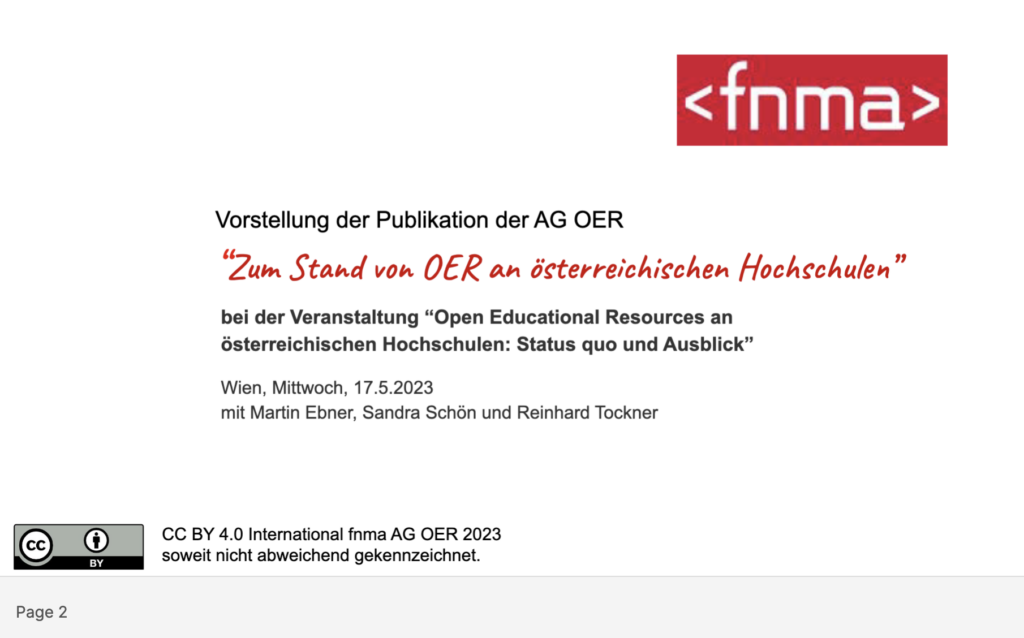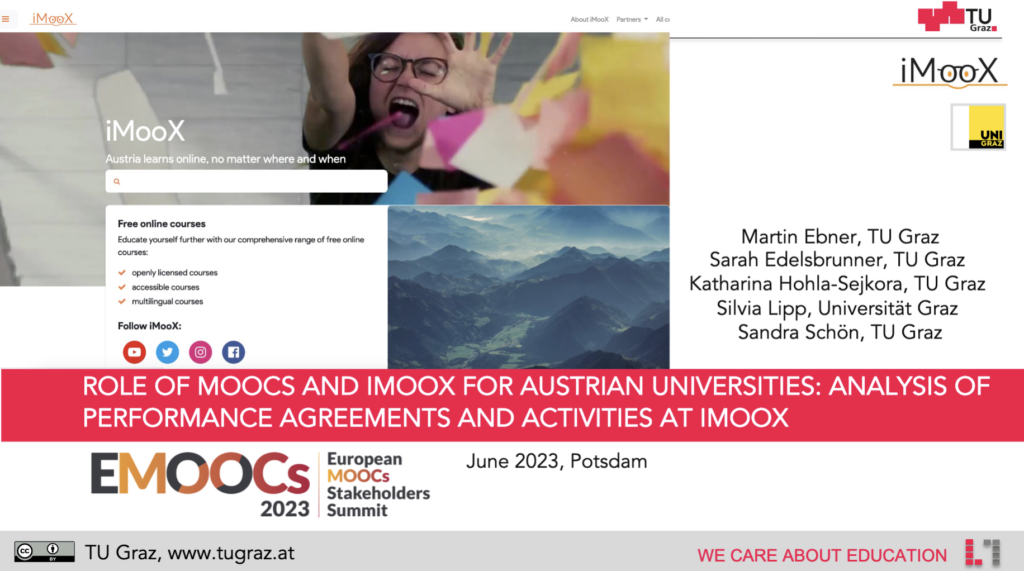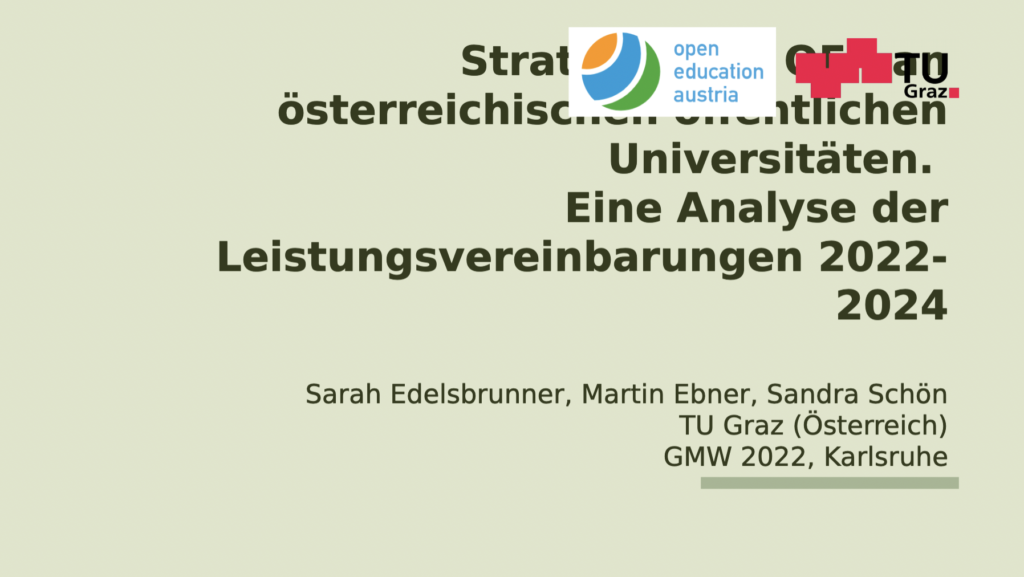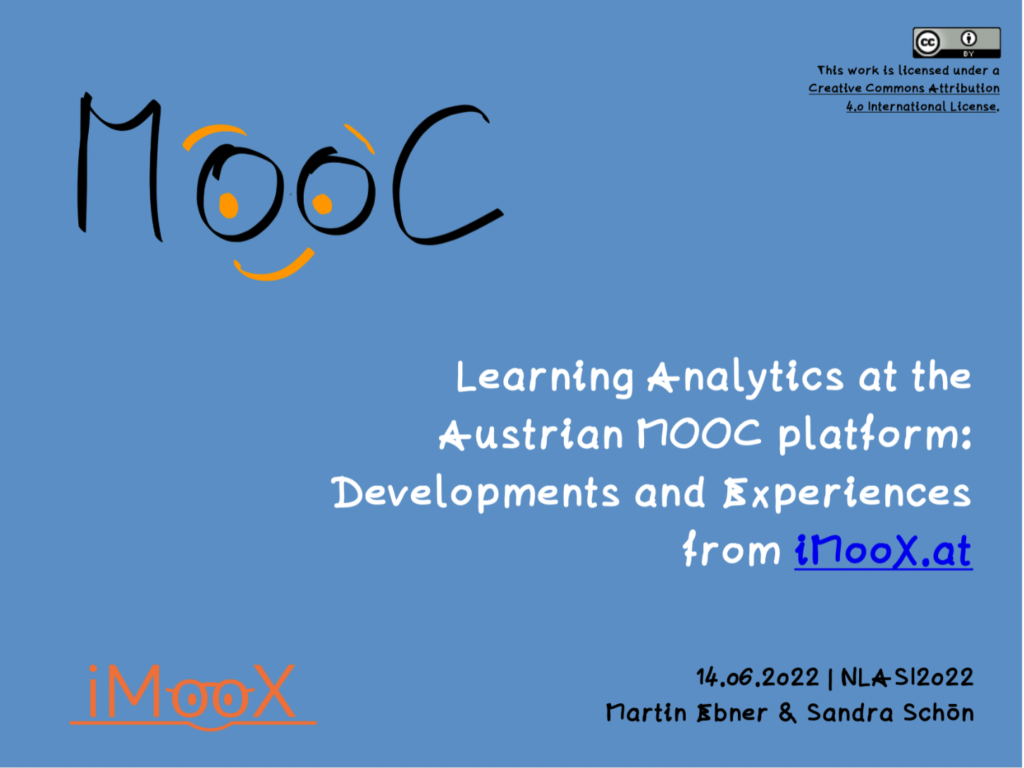Im Rahmen des OER-Events, organisiert von der FNMA, haben wir eine kurze Präsentation gemacht „Zum Stand von OER an österreichischen Hochschulen„. Diese steht jetzt gerne auch online zum Nachlesen zu Verfügung:


Digitale Lehre an und rund um der Technischen Universität Graz
Im Rahmen des OER-Events, organisiert von der FNMA, haben wir eine kurze Präsentation gemacht „Zum Stand von OER an österreichischen Hochschulen„. Diese steht jetzt gerne auch online zum Nachlesen zu Verfügung:

 Issue 18(11) of our journal on emerging technologies for learning got published. Enjoy the readings as usual for free :-).
Issue 18(11) of our journal on emerging technologies for learning got published. Enjoy the readings as usual for free :-).
Table of Contents:
Nevertheless, if you are interested to become a reviewer for the journal, please just contact me 🙂 .
We are happy to share our slides of our research titled „ROLE OF MOOCS AND IMOOX FOR AUSTRIAN UNIVERSITIES: ANALYSIS OF PERFORMANCE AGREEMENTS AND ACTIVITIES AT IMOOX“ for this year EMOOCs conference in Potsdam:

Es freut mich, dass die TU Graz eine interne Initiative startet um das Thema OPENess an der TU Graz zu adressieren. Da sind natürlich Open Educational Resources (OER) ein wichtiger Teil und ich darf sogar die erste Veranstaltung der Serie gestalten. Hier gibt es dazu den Flyer, der dieser Tage verteilt wird:
Ich freu mich über viele Anmeldungen für den 28.6.2023 – einfach an die angegebene Mail-Adresse schicken 🙂
Im Rahmen der GMW 2022 haben wir unsere Analyse zu „Strategien zu OER an österreichischen öffentlichen Universitäten. Eine Analyse der Leistungsvereinbarungen 2022-2024“ vorgestellt. Die Präsentationsfolien dazu sind bereits auf Researchgate veröffentlicht:

Our research, we presented at EdMedia + Innovate Learning 2022, about „The ReDesign Canvas as a tool for the didactic-methodological redesign of courses and a case study“ is now online available:
Abstract:
Initially, in March 2020, when COVID-19 forced conventional face-to-face to pure online teaching, didactic matters were only of secondary importance. At Graz University of Technology (TU Graz, Austria) both the support team for Educational Technology as well as the instructors were mostly concerned with solving technical challenges. Nevertheless, a special tool, the ReDesign Canvas, was available to support lecturers in their endeavor to also address the didactic aspects of their teaching systematically. The article presents the work of the Educational Technology team of TU Graz within the March 2020 COVID-19 crisis as well as the application of the canvas in a redesign of an exemplary lecture.
[full article @ conference homepage]
[draft @ ResearchGate]
Reference: Schön, S., Braun, C., Hohla, K., Mütze, A. & Ebner, M. (2022). The ReDesign Canvas as a tool for the didactic-methodological redesign of courses and a case study. In T. Bastiaens (Ed.), Proceedings of EdMedia + Innovate Learning (pp. 1048-1055). New York City, NY, United States: Association for the Advancement of Computing in Education (AACE). Retrieved July 13, 2022 from https://www.learntechlib.org/primary/p/221410/.
At NLASI in Stockholm we presented what was developed and experienced concerning Learning Analytics at the national MOOC platform iMooX.at

Find here the slides @ ResearchGate.
One of our contributions to the EdMedia + Innovate Learning 2022 is about „A decade of first-semester students surveys concerning IT equipment and communication applications and effect of Covid-19 related experiences for first-year students in 2021„
Abstract:
The technical equipment of first-year students and their preferred communication applications are changing, perhaps also influenced by their experiences in the Covid-19 pandemic concerning digital teaching and learning. This paper presents the 2021 survey of first-year students at Graz University of Technology (N=1,207) and compares the results concerning devices and applications with the results of the surveys conducted since 2011. It is striking that there are no striking changes in the endowment of the that can be interpreted as an effect of Covid-19 pandemic. A question introduced in 2021 about experiences with distance online instruction and experiences with online courses before and after Covid-19 shows clearly that new students‘ prior experiences with online learning here have dramatically changed as a result of school closures in Austria.
[Full paper @ conference homepage]
[draft @ ResearchGate]
Reference: Nagler, W., Schön, S., Mair, B., Ebner, M. & Edelsbrunner, S. (2022). A decade of first-semester students surveys concerning IT equipment and communication applications and effect of Covid-19 related experiences for first-year students in 2021. In T. Bastiaens (Ed.), Proceedings of EdMedia + Innovate Learning (pp. 1060-1067). New York City, NY, United States: Association for the Advancement of Computing in Education (AACE). Retrieved July 12, 2022 from https://www.learntechlib.org/primary/p/221412/